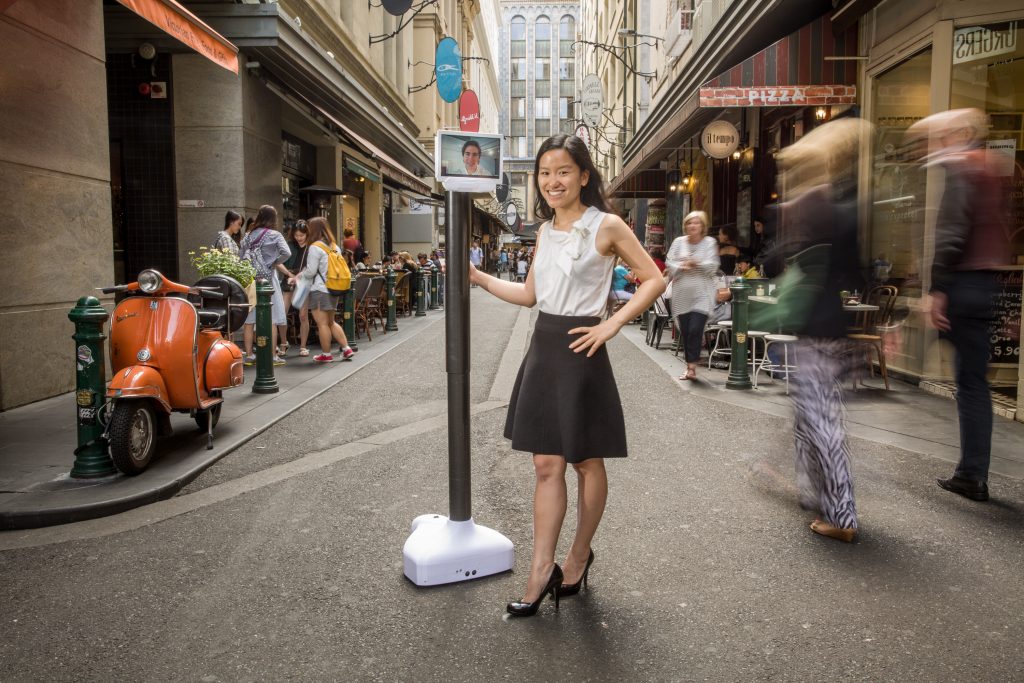When faced with a big, systemic problem, most people put it in the ‘too hard’ basket or assume someone else will fix it.
Not Marita Cheng. Rather than shy away from challenges, the Australian robotics entrepreneur tackles them head-on with tech-based solutions, such as a robotic arm to help people with a disability lift and grasp objects, or an augmented reality app that helps blind people “see” objects.
“It’s so important to ask fundamental questions about why things are needed and how can we do it better for humans, rather than building tech for tech’s sake,” she says.
Cheng has been using technology to help people since 2008. Then a second-year engineering student, she and some fellow students won the Melbourne University Entrepreneurs Challenge. The professor presenting the award suggested Cheng organise a workshop on robotics for a girls’ school in Melbourne’s south-east.
Cheng was keen. She could count the number of women in her class on one hand. She also learned that shortage of female representation at Melbourne University was consistent across the country – and only 14% of engineers in Australia were women.
The workshop was to inspire more girls into studying engineering. But it also planted the seed of an idea – “just a simple idea,” Cheng says – which eventually grew into Robogals: an international student-run organisation that encourages young women to study engineering.
In the dozen years since its launch, Robogals has taught more than 100,000 interactive robotics workshops in the Asia-Pacific, North America, Middle East, Europe and Africa.
Cheng stepped back from running Robogals in 2012, but her passion for robotics burns as brightly as ever. In 2013, she founded and is the current CEO of robotics start-up Aubot, which makes telepresence robots. “We’ve had hundreds of people use our robots around the world,” Cheng says.
A couple of years later, she co-founded Aipoly Vision, an app that helps vision-impaired people recognise objects in real time, using artificial intelligence.
Cheng also picked up a swag of awards and commendations, including 2012 Young Australian of the Year, in 2018 was named one of Forbes’ Top 50 Women in Tech, and is the youngest Member of the Order of Australia (AM). These days, she splits her time between her offices in Melbourne and the San Francisco Bay Area.
Not bad for someone who grew up without ever hearing the word ‘entrepreneur’. “I only learned it in first-year uni,” Cheng says.
Identifying where Cheng channels her attention and energy comes from asking people what they need. “What are the problems out there? How can we create a better solution that’s more effective, that does the job better, faster, cheaper, and safer for humans? I think that’s the very robot we should invest in,” she says.
With her successes have come failures – plenty of them. But in the Bay Area, which includes Silicon Valley, failure isn’t automatically considered a bad thing.
“By working on a failed project along the way, you’ve gained more skills, and you use those skills for another project that has more funding, that has more traction, that has more market need,” Cheng says.
The Bay Area’s attitude is in stark contrast to Australia’s, where failure is deemed unacceptable and, thus, best avoided.
I think people are afraid of failure in Australia,” she says. “I think in the Bay Area, investors are more willing to fund unknowns, whereas in Australia they want to fund a known entity where you’re going to get a return.”
So deep-seated is Australia’s aversion to risk, Cheng made a concerted effort to not only accept failure, but also see its benefits. “I always had a lot of energy and spirit … wanting to work on exciting, interesting things. But I really felt like at university I had to rewire my brain to be OK with doing things that could fail.”
Success in Australia raises yet another obstacle: tall poppy syndrome. Somewhat paradoxically, a 2018 survey found even though nine out of 10 Australians think Australia should be more ambitious, seven out of 10 don’t like to talk about ambitions. Why? Because they’re afraid others will think they’re blowing their own horn a little too much.
The opposite is true of Silicon Valley, Cheng says: “People here are like, ‘Go big or go home’.”
And it’s those self-starting, go-getting entrepreneurs – especially women in tech – that motivate Cheng. “I’m really inspired by women founders, CEOs, who’ve gone out there and made something valuable that people like, and … done it authentically and without giving up a part of themselves,” she says. “And we don’t have enough of them.”
There’s still quite a way to go before Silicon Valley tech firms reach gender parity. At Google, for instance, although women comprise 30% of the workforce and fill just a quarter of the company’s leadership roles, just 17% of its technology staff is female.
And even though Cheng draws inspiration from current women tech leaders, she is a role model too. The “simple idea” that was born out of a student robotics workshop continues to motivate the next generation of women engineers and computer scientists.
“The president of the Robogals Monash chapter, Emily, she actually learned about engineering through a Robogals workshop when she was in high school,” Cheng says.
I just want more girls to learn engineering so they can be part of the journey of creating inventions to help the world.”

